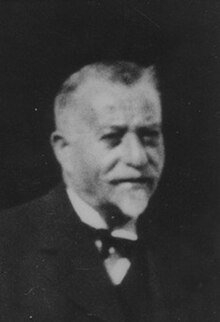|
Neoklis Kyriazis
Neoklis Kyriazis (Greek: Νεοκλής Κυριαζής; 1877 – August 1956) was a Cypriot medical doctor and historian known for his significant contributions to the history of Cyprus. He was a member of the National Council of Cyprus. FamilyNeoklis Kyriazis was born in 1877 in Nicosia. His father was George Kyriazis,[1] one of five Greek brothers from Thessaly, who founded the cigarette empire Kyriazi Freres.[2] His mother was Zafiro Odyssea Chasapoglou [3] great granddaughter of Tselepis Hadji-Petrakis Kytherios (1770–1830), one of the richest landowners in Cyprus.[4] Neoklis’ maternal grandmother, Maritsa Tano, was a descendant of the Tano family, belonging to the Italian nobility.[5] He married Maria Pieridi (1871–1953), herself a descendant of another Italian nobility family (Cariddi).[6][7] Historical workKyriazis was a member of the National Council of Cyprus.[8] As a member of the St Lazarus Committee he founded the Museum of St Lazarus church in Larnaca.[9] One of his greatest achievements was the salvage and subsequent publication of many historical details concerning Cyprus through the ages.[10] He started publishing articles on this subject from 1909, and over a period of 47 years he published several books and over 370 articles and studies. He participated in the publication of the monumental ‘Cyprus Chronicles’ (Kypriaka Chronica) a scientific/historical magazine (1923–1937) consisting of 4200 pages.[11][12] These Chronicles were under the auspices of a four-member committee (the Bishop of Kition Nikodemos Mylonas, prof. Ioannis Sykoutris, Loukis Z Pieridis, and Neoklis Kyriazis), and covered every aspect of the history of Cyprus from the ancient times through to the Turkish and subsequently British occupation. Kyriazis was the only, or nearly only, author of this periodical from 1929–1937. Medical doctorHe worked as medical doctor in Larnaca and wrote both scientific and popular papers on the Cypriot Medical History, a subject continued by his grandson Dr Marios Kyriazis.[13] As a doctor he was credited with the founding of a quarantine facility to prevent the spread of communicable diseases from sailors visiting Larnaca. His medical library, instruments and other memorabilia are now exhibited at the Kyriazis Medical Museum in Larnaca. Books
HonoursThe Bishop of Kition said: Kyriazis was a rare and constructive personality with live national consciousness and selfless love for this island.[14] Larnaca Municipality honoured Kyriazis by naming a street after him. The Society of Cypriot Studies dedicated a commemorative plaque [15] in the courtyard of St Lazarus church. This roughly translates as:
References
|
||||||||||||||
